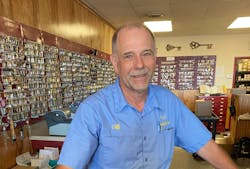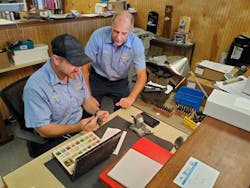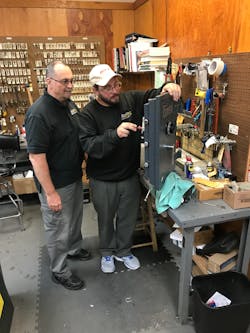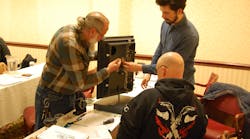I’ve worked in this industry as an outside salesperson for just under 30 years and have become familiar with many businesses in my territory of New Jersey, Eastern Pennsylvania and Delaware.
Quite often, I hear owners asking whether I know of any locksmiths who are looking for a change. Everyone seems to be short-handed, and most of the young people entering the business are related to someone in a shop, typically the owner(s). I recently spoke with two locksmiths about recruiting and training new locksmiths.
CLC Locksmiths
My first visit was with Cliff Shafer of CLC Locksmith in Cinnaminson, New Jersey. Shafer’s father began the business in 1972 after completing the Little Falls School of Locksmithing correspondence course. He moved the business to its current location in 1978.
Locksmith Ledger: Did you have any formal training as an apprentice?
LL: Would you rather hire someone who has experience, or do you prefer to teach locksmithing a particular way?
Shafer: It all depends on the immediacy of our needs. Early on, we couldn’t afford to pay much, because we weren’t making all that much ourselves. We brought in retirees, because we just needed part-time extra help. We’ve also hired technicians who had some experience working for other locksmiths and have had various levels of success with them.
The other potential employee resource we’ve had great success with is the local high school. They have a cooperative education coordinator, and we ask for someone to come in the afternoons to see whether this is something they’d be interested in. That’s how we got a number of employees who became full-time locksmiths with us. Several have since moved on, including one who was “poached” by the state of New Jersey. We’ve continued to have people come over from the high school. Some would stick around for a couple of months and a few for even less time. Some didn’t have the knack or whatever it takes to thrive as a locksmith; others realized that they just didn’t have any interest in it as a career.
LL: Where do you start when you bring someone in? Is it different now from 20, 30 years ago?
Shafer: The first thing we teach is how to identify keys. When someone brings in a key to duplicate, how do you choose the correct blank to use? We teach them how to use the Ilco key directory and how to cross-reference if it’s an aftermarket blank. That takes time. We pull keys out of the scrap heap and ask them to identify neuter bows, etc. Give them a keyed cylinder to make a duplicate for. Find the right blank and cut it.
LL: Is it different teaching a high-school kid as opposed to an adult?
Shafer: You can’t just bring [an adult] in and pay them minimum wage, because most can’t live on that. That’s why we have a pretty short rope: We can’t afford to spend too much time if they’re not getting it. We look to see if someone is teachable. There have been kids who come here who just aren’t serious, and some realize early on this isn’t for them.
When I was the convention chair for the 2019 GPLA convention, I came up with the theme “Securing your Future – No Degree Required.” That theme was in response to kids going to college and being saddled with enormous amounts of student debt and not necessarily finding a job in the field they went to school for. We let them know that they can make a substantial living as a locksmith if they apply themselves. We’re going to pay them to learn a trade, and as they progress, they’ll earn more.
In the case of George [the shop’s newest technician], he’s a fast learner. We had a large SFIC keying job, and George was able to be productive and earn his keep quickly.
LL: Are you able to get a feel for where an apprentice will be best used when you start working with them?
Shafer: When we hired one of our current technicians, Tim, a relatively young guy, he was more in tune with electronics, so I was trying to get him more involved with access control — not only the hardware but the software especially. As much as I hate to admit it, my old brain doesn’t take to it as quickly as some younger folks.
LL: Is there enough of that work to keep everyone busy?
Shafer: Yes. There’s plenty of large institutions, schools and bank work as well. I don’t do any automotive work, but Tom [Larry Shafer’s son] does. We need to get someone else in here to help with automotive. Tom is so crazy busy with automotive as well as running the shop that he’s too busy to take the time needed to teach someone. We frequently send George out with Don, our long-time senior technician. Don has more time to teach, because they’re together in the vehicle and then on-site without the interruptions that happen while in the shop. That’s why Don has largely been responsible for the success we’ve had with some of our techs.
LL: Are there any other benefits to you that result from getting employees from the high-school cooperative program?
Shafer: You can get tax credits from the state for apprentice teaching. You also can get similar credits in New Jersey for retraining someone, like George, who came from another industry. This way you can afford to pay them more and recoup part of it. It can be difficult to get a good return on your investment when it comes to training new people. If an apprentice is out with Don, then Don will be slowed, because he’s explaining things as part of the process. You can’t charge the customer for the extra time, so it’s a nonbillable expense.
LL: Is there anything else to consider about people when evaluating the risk-reward process?
Shafer: When you’re assessing somebody, they could have all the talent and skill, but if they aren’t a team player or don’t get along well with others or don’t work out for any number of reasons, like absenteeism or lacking self-motivation, all those things figure into the equation.
LL: How much do you enjoy bringing on a new person?
Shafer: It’s a challenge. The stress comes from not wanting to be too quick with the hook, because everyone progresses at their own pace, and you have to be careful about comparing them with someone else who learned really quickly. If someone shows promise but is a little slower than you’d like but they have a great personality working with customers, then that will buy someone more time to develop.
Arnold’s Lock & Safe
My next visit was with Ed Fitzgerald of Arnold’s Safe & Lock in Pennsauken, New Jersey. Fitzgerald’s locksmithing experience began as an apprentice with Martin Arnold, the original owner, in 1976.
LL: Do you remember your initial training?
Andy would take a Schlage A series lock or a Corbin Grade 1 knob lock and hand it to me in a box all taken apart. My task was to put it back together in working order. The Corbin was pretty heavy duty. I’d have it all back together, and he’d show me a part he left out on purpose and ask, “what about this?” After a while, I’d know something was missing, and I’d ask for it. That’s how I knew I was learning.
What you’re looking for in an apprentice is someone who has mechanical reasoning skills. This was training for when a customer walked in with their lock in a box. Sometimes you’d have someone walk in with an exploded mortise lock in a box, because they thought they could fix it themselves, and now you had to figure out, what was where? What did this spring look like? So much of it was hands-on learning back in the day.
LL: How is locksmithing taught these days to an apprentice? Have the basics changed?
Fitzgerald: I still teach the way I was taught. Begin with the keyboard. Pull a bunch of keys off and throw them in a box. Provide the key catalog along with some paper and ask them to list the Ilco number as well as the lock manufacturer it fits. This way they learn how to do it themselves. If it has an old Taylor number, they have to convert it to the Ilco.
LL: Are you aware of any formal apprenticeship programs for locksmiths?
Fitzgerald: If you’re part of the New Jersey Public Works Contractors Program. If you want to bid on a job at a school or municipality or for the state and it’s over X amount of dollars, then you have to pay your people a prevailing wage to match union scale, because you’re not a union shop.
Two years ago, the rules were changed, and now you’re required to have an apprentice program in place like unions do. There’s a Contractors Association that has an apprentice program. You could become a member of their association for a fee, and now you’re a member of an association that has an apprenticeship program. As long as you’re part of it and it’s available to your employees for training, you’re qualified to bid on these jobs.
LL: How did you find your latest technician?
Fitzgerald: By placing an ad on Indeed.com. Mike [Sundy] came in for an interview while working for a company that employed drivers to handle vending machines. They have an electronic device they use to track items going in and out. Mike’s job was to repair these devices, so he already had some background with electronics.
LL: What did your ad say, roughly?
Fitzgerald: Help wanted, locksmith for a busy shop. Experience helpful but not necessary. Typically, I’ll add something like “on the job training available.” I’m willing to train most anybody, but I’d like them to have some mechanical ability. I’d like to avoid having someone who has trouble turning a screwdriver.
I don’t look for someone with much electronics background, because I don’t do much of it, but most of the young guys these days pick it up pretty easily. We’ve brought [Mike] up to speed on the Alarm Lock Trilogy, for example, so he could program and do audit trail and handle the software.
LL: Have you always placed ads in the Help Wanted for new people?
Fitzgerald: Yes, and we also took advantage of the co-op program at the local high school. That’s how Chuck Hoffman started. He began at the beginning of 1982, and he’s still here. Chuck Dixon, who now has his own business, came to us under the same program a few years later.
LL: Do you have a set way you go about starting someone out, or do you tailor the training to the individual?
Fitzgerald: If you have someone coming from another trade who knows how to use tools, then you could figure they’d be a good road guy. We’ve had about six guys come through the co-op program, but the two I mentioned are the ones who stuck with it. Youngsters now are hesitant to commit to something like this early on in life. The ones who work out, like Mike, tend to be older and more mature. He’s 31. Not to say we’re not college material, but many locksmiths chose not to go [to college], and many thrive in our industry in spite of that. If you’re in your late 20s or early 30s, what are your choices without college? Locksmithing is a terrific alternative for making a good life for yourself.
LL: Does the locksmith industry still have that to offer a young person?
Fitzgerald: I think so if you talk to the right people. There are too many shops in my opinion that don’t offer enough to a prospective employee: healthcare, retirement, vacation time. Pretty basic stuff today, but not everyone offers it. As the employer, you have to ask what the prospective employee wants from the place they work. I’m going to let them know what I need from them — produce for the company. At the same time, I recognize that most people want more than just a paycheck, and I’ll let them know that. You have to promote what’s in it for them.
LL: Do you believe the industry would benefit from putting together something like a formal apprenticeship program?
Fitzgerald: The difficulty with that is we have trade schools pumping out plumbers, electricians and HVAC techs, because there’s such a high demand for those services. Very often the lock work is lumped in with the carpenters. Our only niche there is if they need unusual hardware, like the LKM10K locks that Lockmasters makes. It’s a 2–3-hour installation for an experienced technician. In this case, you need to be certified to work on it. It would help us if other manufacturers required that for their hardware, for warranty purposes.
LL: If someone walked in today who was interested in locksmithing, would you consider hiring them?
Fitzgerald: I’m thinking about hiring someone now, yes. The other Mike working here, Mike Howe, had a lot of experience working with commercial doors and hardware. I got his name from an architectural hardware company I used to deal with. We called him, and he interviewed with us in the late ’90s. I keep old resumes and called him in 2006, and he’s been with us ever since. I still reach out to people who’ve interviewed in the past. It never hurts to check. Now is a good time to promote the industry since COVID shut down so many places, resulting in so many scrambling for work.
Steve Kaufman has worked for distributors in the locksmith industry since 1993 and worked as a full-time locksmith from 1978 through the 1980s. Kaufman is the sales manager for IDN Hardware out of its Philadelphia location.








